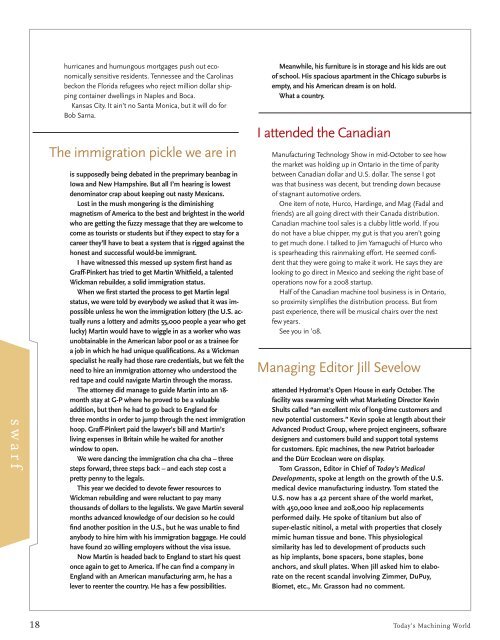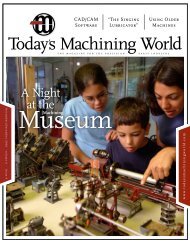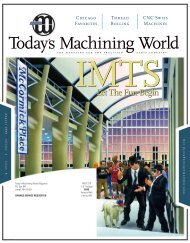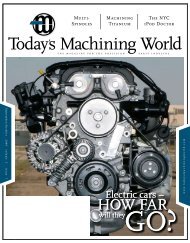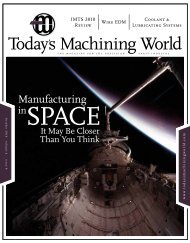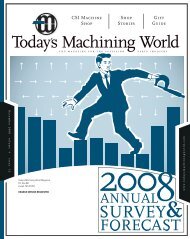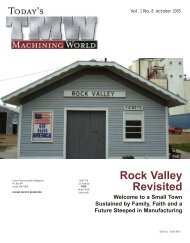Recycled - Today's Machining World
Recycled - Today's Machining World
Recycled - Today's Machining World
Create successful ePaper yourself
Turn your PDF publications into a flip-book with our unique Google optimized e-Paper software.
s w a r f<br />
18<br />
hurricanes and humungous mortgages push out economically<br />
sensitive residents. Tennessee and the Carolinas<br />
beckon the Florida refugees who reject million dollar shipping<br />
container dwellings in Naples and Boca.<br />
Kansas City. It ain’t no Santa Monica, but it will do for<br />
Bob Sarna.<br />
The immigration pickle we are in<br />
is supposedly being debated in the preprimary beanbag in<br />
Iowa and New Hampshire. But all I’m hearing is lowest<br />
denominator crap about keeping out nasty Mexicans.<br />
Lost in the mush mongering is the diminishing<br />
magnetism of America to the best and brightest in the world<br />
who are getting the fuzzy message that they are welcome to<br />
come as tourists or students but if they expect to stay for a<br />
career they’ll have to beat a system that is rigged against the<br />
honest and successful would-be immigrant.<br />
I have witnessed this messed up system first hand as<br />
Graff-Pinkert has tried to get Martin Whitfield, a talented<br />
Wickman rebuilder, a solid immigration status.<br />
When we first started the process to get Martin legal<br />
status, we were told by everybody we asked that it was impossible<br />
unless he won the immigration lottery (the U.S. actually<br />
runs a lottery and admits 55,000 people a year who get<br />
lucky) Martin would have to wiggle in as a worker who was<br />
unobtainable in the American labor pool or as a trainee for<br />
a job in which he had unique qualifications. As a Wickman<br />
specialist he really had those rare credentials, but we felt the<br />
need to hire an immigration attorney who understood the<br />
red tape and could navigate Martin through the morass.<br />
The attorney did manage to guide Martin into an 18-<br />
month stay at G-P where he proved to be a valuable<br />
addition, but then he had to go back to England for<br />
three months in order to jump through the next immigration<br />
hoop. Graff-Pinkert paid the lawyer’s bill and Martin’s<br />
living expenses in Britain while he waited for another<br />
window to open.<br />
We were dancing the immigration cha cha cha – three<br />
steps forward, three steps back – and each step cost a<br />
pretty penny to the legals.<br />
This year we decided to devote fewer resources to<br />
Wickman rebuilding and were reluctant to pay many<br />
thousands of dollars to the legalists. We gave Martin several<br />
months advanced knowledge of our decision so he could<br />
find another position in the U.S., but he was unable to find<br />
anybody to hire him with his immigration baggage. He could<br />
have found 20 willing employers without the visa issue.<br />
Now Martin is headed back to England to start his quest<br />
once again to get to America. If he can find a company in<br />
England with an American manufacturing arm, he has a<br />
lever to reenter the country. He has a few possibilities.<br />
Meanwhile, his furniture is in storage and his kids are out<br />
of school. His spacious apartment in the Chicago suburbs is<br />
empty, and his American dream is on hold.<br />
What a country.<br />
I attended the Canadian<br />
Manufacturing Technology Show in mid-October to see how<br />
the market was holding up in Ontario in the time of parity<br />
between Canadian dollar and U.S. dollar. The sense I got<br />
was that business was decent, but trending down because<br />
of stagnant automotive orders.<br />
One item of note, Hurco, Hardinge, and Mag (Fadal and<br />
friends) are all going direct with their Canada distribution.<br />
Canadian machine tool sales is a clubby little world. If you<br />
do not have a blue chipper, my gut is that you aren’t going<br />
to get much done. I talked to Jim Yamaguchi of Hurco who<br />
is spearheading this rainmaking effort. He seemed confident<br />
that they were going to make it work. He says they are<br />
looking to go direct in Mexico and seeking the right base of<br />
operations now for a 2008 startup.<br />
Half of the Canadian machine tool business is in Ontario,<br />
so proximity simplifies the distribution process. But from<br />
past experience, there will be musical chairs over the next<br />
few years.<br />
See you in ’08.<br />
Managing Editor Jill Sevelow<br />
attended Hydromat’s Open House in early October. The<br />
facility was swarming with what Marketing Director Kevin<br />
Shults called “an excellent mix of long-time customers and<br />
new potential customers.” Kevin spoke at length about their<br />
Advanced Product Group, where project engineers, software<br />
designers and customers build and support total systems<br />
for customers. Epic machines, the new Patriot barloader<br />
and the Dürr Ecoclean were on display.<br />
Tom Grasson, Editor in Chief of Today’s Medical<br />
Developments, spoke at length on the growth of the U.S.<br />
medical device manufacturing industry. Tom stated the<br />
U.S. now has a 42 percent share of the world market,<br />
with 450,000 knee and 208,000 hip replacements<br />
performed daily. He spoke of titanium but also of<br />
super-elastic nitinol, a metal with properties that closely<br />
mimic human tissue and bone. This physiological<br />
similarity has led to development of products such<br />
as hip implants, bone spacers, bone staples, bone<br />
anchors, and skull plates. When Jill asked him to elaborate<br />
on the recent scandal involving Zimmer, DuPuy,<br />
Biomet, etc., Mr. Grasson had no comment.<br />
Today’s <strong>Machining</strong> <strong>World</strong>


